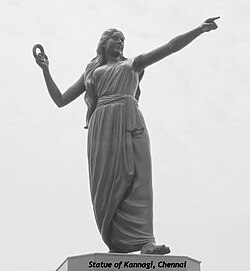Silambu
The silambu (Tamil: சிலம்பு, Malayalam: ചിലമ്പ്)[needs IPA] is an anklet worn and used in a variety of contexts on the Indian subcontinent.

EtymologyEdit
According to Jeyaraj, the word 'silambu' is derived from the verb 'silambal', meaning 'to make sound'.[1]
DescriptionEdit
The silambu is a hollow anklet filled with beads that produce noise when the wearer moves or dances.[2] It may be worn on the ankle or the leg. When worn on the leg, it is termed kālchilambu in Tamil.[3]
Some varieties of silambu are made of copper and use iron balls to produce sound.[4] Others are made of silver.[5]
In danceEdit
Nautch performers wore silambu.[2]
Kandyan dancers may wear silambu.[4]
In Tamil Nadu, a traditional dance called kai silambu aatam is performed in temples during Amman festivals in which the dancers wear or hold silambus in their hands, which make noise when shaken.[citation needed]
In literatureEdit
The epic Silappatikaram is structured around the character Kannaki's attempt to sell her silambu, and takes its title from the name of the anklet.[6][7]
In festivalsEdit
Silambu are sometimes placed on cows' legs during the Pongal festival.[8]
In religionEdit
Shiva in the dancing pose nataraja sometimes wears a silambu on his ankle.[citation needed]
Silambu may be used in Theyyam worship.[citation needed]
GalleryEdit
See alsoEdit
NotesEdit
- ↑ Jeyaraj 1999, p. 39.
- ↑ 2.0 2.1 Sambamoorthy 1976, p. 6.
- ↑ Sambamoorthy 1976, p. 23.
- ↑ 4.0 4.1 Banerji, Projesh (1959). The Folk-Dance of India. Allahabad: Kitabistan. pp. 189–190.
- ↑ Marcuse, Sibyl (1975). "Silambu". Musical Instruments: A Comprehensive Dictionary. New York: Norton. p. 476.
- ↑ Chakravarti, A. (1944). Jaina Literature in Tamil. New Delhi: Bhāratīya Jñāpītha. p. 51.
- ↑ The Śilappadikāram. Translated by Dikshitar, V. R. Ramachandra. Oxford University Press. 1939. p. 1.
- ↑ Sambamoorthy 1976, p. 24.
SourcesEdit
- Jeyaraj, V. (1999). "Analysis of a Bronze Anklet from Kerala". Museum's Journal. Government Museum, Chennai.
- Sambamoorthy, P. (1976). Catalogue of Musical Instruments Exhibited in the Government Museum, Chennai. Chennai: Principal Commissioner of Museums, Government Museum.